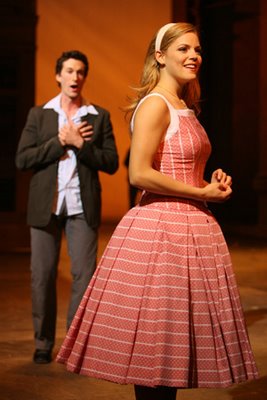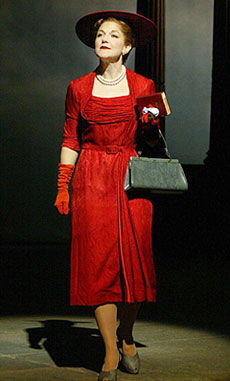Go Light on the Pizza
 Live from Lincoln Center, for its once-a-year "high cultural programming" on PBS, brought us a recent American musical last night, Lincoln Center Theater's The Light in the Piazza, a collaboration between Adam Guettel (music and lyrics) and Craig Lucas (book). You may remember the movie made from the same book (a 1960 novella by Elizabeth Spencer) in the 1960s: Olivia de Havilland is escorting her retarded daughter (60s sex kitten Yvette Mimieux) through Italy, where she falls in love with a simple-minded Italian boy (the young George Hamilton). It has not yet been released on DVD as far as I know.
Live from Lincoln Center, for its once-a-year "high cultural programming" on PBS, brought us a recent American musical last night, Lincoln Center Theater's The Light in the Piazza, a collaboration between Adam Guettel (music and lyrics) and Craig Lucas (book). You may remember the movie made from the same book (a 1960 novella by Elizabeth Spencer) in the 1960s: Olivia de Havilland is escorting her retarded daughter (60s sex kitten Yvette Mimieux) through Italy, where she falls in love with a simple-minded Italian boy (the young George Hamilton). It has not yet been released on DVD as far as I know.
The musical version reminded me of all the qualities that I dislike in musicals: the mediocre singers who hobble along with amplification, the hackneyed jokes, the faded musical clichés. Incredibly, this musical not only confirmed my antipathy for the entire genre but even annoyed me further. One of its conceits is that most of its action occurs in Florence, so the Italian characters sing and speak principally in Italian -- poorly, for the most part. The script reads well on paper to my ear, but native Italian speakers may find false notes in the words themselves. For the performance to sound authentic, however, the director should have cast Italian actors. It sounds mostly fake. Chris Sarandon (the Italian father, Signor Naccarelli) sounds like an American tourist reading from an Italian phrase book -- in the intermission feature, he admits that his "Italian is non-existent." Patti Cohenour (Signora Naccarelli) was no better but mercifully had fewer Italian lines to speak. Sarah Uriarte Berry (the Italian sister-in-law Franca Naccarelli) claimed that she was "channeling" her Spanish (Basque) grandmother, changing the accent to make it "more Italian." It didn't work: I thought she was channeling Rita Moreno in West Side Story. Michael Berresse (Giuseppe Naccarelli) and Aaron Lazar (Fabrizio Naccarelli) were better.
For the performance to sound authentic, however, the director should have cast Italian actors. It sounds mostly fake. Chris Sarandon (the Italian father, Signor Naccarelli) sounds like an American tourist reading from an Italian phrase book -- in the intermission feature, he admits that his "Italian is non-existent." Patti Cohenour (Signora Naccarelli) was no better but mercifully had fewer Italian lines to speak. Sarah Uriarte Berry (the Italian sister-in-law Franca Naccarelli) claimed that she was "channeling" her Spanish (Basque) grandmother, changing the accent to make it "more Italian." It didn't work: I thought she was channeling Rita Moreno in West Side Story. Michael Berresse (Giuseppe Naccarelli) and Aaron Lazar (Fabrizio Naccarelli) were better.
The story is a nice story, and the book (by Craig Lucas, with lyrics by the composer, Adam Guettel) is charming in a Broadway kind of way. At least, as Michael Feingold observed in his Village Voice review (Passione All'Americana, April 19, 2005) -- two parts negative, one part positive -- of the first run last year, this is a musical about human characters, rather than about stage effects or plot gimmicks. I found the music equally innocuous, heavy-handed in its borrowing from Gershwin. Isn't that a phrase ("to my heart he carries the key") from Someone to Watch over Me that we hear at the moment young Clara (Katie Clarke, one of those Disney music theater sopranos) and Fabrizio meet in the Piazza della Signoria, as her hat flies away in the wind and he catches it? The set is supposed to look like that famous square in Florence, and they meet on the site where Savonarola was executed.
The instincts of Broadway composers are so unoperatic in many ways. When Clara's mother finally explains the childhood brain injury that caused her daughter's problems (near the end of the first act), it is a moment that seems to call out for a dramatic aria. In The Light in the Piazza, Victoria Clark (Margaret Johnson), who was very good, speaks the words, somewhat matter-of-factly, followed by a joke. In general, the singing meets the lower standards set by Broadway audiences, problems of intonation, weakness, nasality generally being overlooked. Sometimes, it exceeds those standards, but not very often. It is what it is.





















































No comments:
Post a Comment